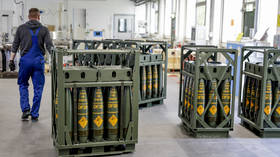German military giant to build ammunition plant in Baltic state

German arms manufacturer Rheinmetall has struck an agreement with Lithuania’s government to build a new ammunition factory in the Baltic state, according to a statement the company released on Monday.
Lithuania has touted the deal as another step towards strengthening its defense sector, adding that the project is of importance to the state.
Lithuanian Economy Minister Ausrine Armonaite said Rheinmetall would invest more than €180 million ($195 million) in the new plant, which is expected to produce 155-millimeter artillery shells. She says the agreement “will help us to ensure uninterrupted access to essential weapons and ammunition.”
The location of the new factory, which is set to produce tens of thousands of rounds of ammunition every year, is expected to be announced in the upcoming weeks. No details were given regarding the possible start date for its construction.
In March, Rheinmetall confirmed that it planned to build a factory in Lithuania, a member of the EU and NATO. A letter of intent was signed with Vilnius in mid-April, before the Baltic country’s parliament passed several bills to encourage investment in its defense.
According to the German news agency DPA, Rheinmetall has already been operating a maintenance center with defense company Krauss-Maffei Wegmann in Lithuania since 2022. The facility maintains combat vehicles used by NATO units stationed in the region, as well as the Leopard 2 battle tanks given by Germany to Ukraine.
Rheinmetall has been seeking to expand production to meet a surge in demand prompted by the Ukraine conflict. Germany has donated more military equipment to Kiev than any other country except the US.
According to media reports, the German military also plans to permanently station an armored brigade of 5,000 in Lithuania less than 20km (12 miles) from the border with Belarus, a key ally of Moscow.
A roadmap for what will be Berlin’s largest deployment on foreign soil since World War Two was signed by the defense ministers of Germany and Lithuania in December.
Berlin plans to keep 4,800 troops and 200 civilian specialists in the country on a permanent basis, complete with heavy armaments and support structure. The relocation will start in the second quarter of 2024, with the brigade scheduled to reach full combat readiness by 2027, according to the German Defense Ministry.
Moscow perceives the movement of NATO capabilities closer to its borders as a provocation and a threat to its national security. Lithuania shares a border with the Russian exclave Kaliningrad.













